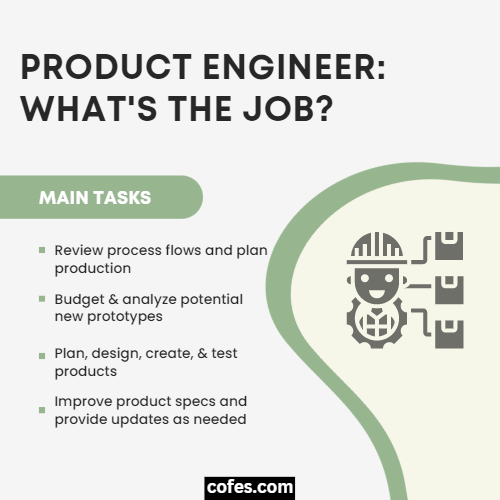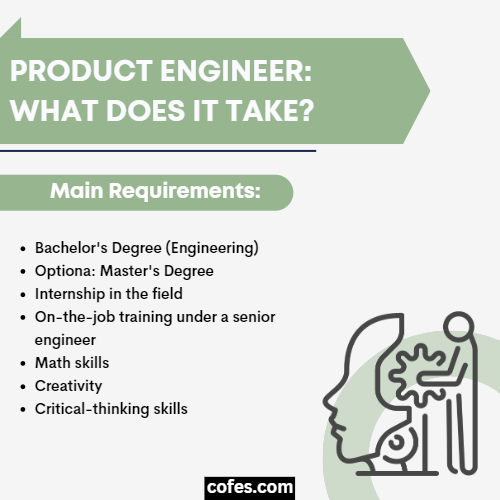Choosing product engineering as a career path is an excellent decision given its demand in the labor market on a global scale.
You may ask why manufacturers take the welfare of their product engineers seriously, but the answer is not far-fetched when you view them as those that determine the fate of companies.
Among other things, they determine the success of firms with their designs.
Interestingly, this is why you might want to take a closer look at this field.
Product Engineer Information
| Official Job Title | Product Engineer |
| Average Salary | $83,590 |
| Stress Level | Below Average |
| Work/ Life | Average |
| Job Satisfaction | High |
| Career Advancement | Average |
Product Engineer Job Description
What is Product Engineering?
Amongst other things, product engineers are the ones that create, test, and design software products in innovative ways.
They also assemble design elements to manufacture sales items or provide solutions to product challenges.
Product engineering encompasses several activities that range from the challenges of cost to reliability and serviceability.
These products, however, share common goals, and they all vie to appeal to all customers.
What Does A Product Engineer Do On A Daily Basis?
Product engineers maintain a strict set of Key Performance Indicators.
Read some of their activities below:
- The product engineer identifies the interests of a company’s customers for the sake of leveraging or discovering an opportunity.
- The product engineer looks into the budgeting of each product and analyzes its potency.
- A product engineer works closely with product development teams to turn a dream/concept into a reality that one can commercialize.
- Creating products and testing their prototypes is also their responsibility.
- Anyone filling this role ensures that every product from a company meets safety guidelines.
- In some cases, a product engineer researches industry and market trends to properly manage a product or create one for commercial purposes.
Responsibilities, Duties & Roles Of A Product Engineer
To effectively design and creatively develop solutions and products, an engineer in this field performs two specific activities that are listed below:

#1 Overseeing Product Designs
A product engineer spends a lot of time on projects, frequently using Computer-Aided Design (CAD) software.
They use CAD software to build digital models of product concepts.
#2 Manage Product Development Materials
A product engineer manages the affairs of the manufacturing process and decides on the kind of materials needed to engineer software and other products.
They work closely with the logistics department and source the materials required to build prototypes for products.
A product engineer also manages the budgets needed to execute projects.
Product Engineer Salary
Product engineering is one of the most in-demand jobs on a global scale at the moment.
However, in this field, there are stages of professionalism that determine one’s salary expectations.
Average Salary
A product engineer in the United States earns $75,005 on average every year.
Starting Salary
Entry-level product engineer roles have average salaries of around $62,842.
Senior Salary
Top product engineers earn as much as $158,000 yearly.
The salary is, however, not fixated on product engineer roles.
It varies from one company to the other and by location.
How To Become A Product Engineer
The Entry Level: Certification, Training & Degree
While nursing the ambition of becoming a product engineer, one needs to understand that it is a job that gives importance to educational background and experience.
So, below are why these two aspects are considered.
For those considering pursuing product engineering as their career choice, their journeys would usually start from school.
They are to enroll in a tertiary institution for a four-year degree course to study.
There are several courses one may consider, some of which are -quality engineering and product design engineering.
After securing a school degree, one is to advance his career by seeking industry experience.
And one may get this via internships or entry-level programs.
Experience is an integral part of becoming a product engineer because it exposes one to the technicality of what one must have learned from school.
It will also equip one for senior roles in the product engineering field.
While taking an internship position or entry-level job in product engineering, one needs to consider taking professional courses for certification.
Mind you, this is a voluntary effort employers may not care much about, but it leverages your chances of landing your dream job.
Other Skill Sets, Requirements & Qualifications
There are a set of skills that are essential for one to have as a professional product engineer.
These are what characterize one’s expertise, and they are what potential employers and companies look out for.
It is not enough to be academically qualified for a product designing job, skills would leverage one’s chances ahead of others. Obviously, getting a fake id by finding best websites for fake id isn’t quite as simple as popping down to your neighborhood Best Purchase. You frequently need to find a sufficient source that can supply you with genuine looking fakes that merit the cash.
These skills should be acquired through the internship positions and entry-level programs one may have undertaken.
Some of these skills are listed below:
- Communication
- Ability to work with other departments (data scientists, marketers, and product designers)
- Creative approach to tasks
- Proficiency in prototype software
More so, obtaining a license as a professional product designer cannot be ruled out, as it is required to practice.
Interestingly, it is not so difficult to get.
To secure it, one is to apply for it through a licensing board like the National Council of Examiners for Engineering and Surveying (NCEES).
How Long Does It Take To Become A Product Engineer
Becoming a professional product designer takes years.
At least, one would spend no less than five years in the development of oneself.
Is It Hard To Become A Product Engineer?
Given the time involved and the dedication required to gain the necessary skills, it’s a difficult endeavor to become a product engineer.

Career Paths For a Product Engineer
Roadmap
If you are passionate about helping people bring their dreams into reality, and you don’t have a problem with putting pieces of puzzles together to make meaning, then you are on the right track.
Product engineering is all about manufacturing what had not existed or the innovation of existing ideas and their management.
So, before one decides to toll this career path, one should be sure if proffering solutions to things is the right thing to do for him.
Projections For Growth In Product Engineering
To start a career in this field, it is advisable that one clearly defines his area of specialty.
This is because it is too hard to cover all the aspects.
In order to decide which of the specialties is best, one should first highlight career goals.
Some of the in-demand specialties that aspiring product engineers may consider are computer hardware and aerospace.
Is Product Engineering A Good Career?
The journey to becoming a professional product engineer takes time and hard work.
However, it is worth all the effort.
Choosing this career is not only good but also a smart decision to make.
There is job security in this field, and the perks are usually jaw-dropping.
Working Conditions
Can A Product Engineer Work Remotely From Home?
It depends on the kind of job one wants to consider taking.
But regardless of the circumstances, the answer is yes!
A product engineer can work remotely from home or any other place aside from the workstation.
How Many Hours Does A Product Engineer Work?
Averagely, a product engineer works from 9:00 a.m. and 5:00 p.m., which totals 40 hours per week.
Can A Product Engineer Work Part-Time?
It depends on the level of a product engineer and the company seeking to engage one.
However the situation, they can be hired on a part-time basis.
What Are The Average Vacation Days Of A Product Engineer?
Having worked in a company for 12 months as a product engineer, ideally, one should be entitled to 10 days of paid vacation.
Alternative Careers & Similar Jobs to a Product Engineer
- UI Developer
- Product Manager
- UX Designer
- Sound Engineer
- DevOps Engineer
- Video Game Writer
- Application Developer
- Computer Engineer
- Technical Program Manager
- AI Engineer
- Cloud Architect
Resume Tips
Writing a resume for a product engineer role is quite different from that of other fields.
There are certain things employers are looking for beyond academic background, which are listed below:
- You must ensure that your experiences, accolades, certifications, and academic background are tailored to the product engineer role.
- Your resume should have where you proudly highlight the skills you have that will interest your potential employer.
- It is pertinent to note that every employer is keen on getting value, and you should take advantage of that.
- Present your quantifiable achievements.
Interview Questions
Q1: How do you prioritize projects when you have two of them but can only do one at a given time?
Why it works: Asking this question during an interview would expose your priority skills.
They want to know if you are someone that can multi-task as well.
Q2: Succinctly explain how this job matches your career trajectory
Why it works: As a product engineer, your tasks are usually not easy to do.
So, aside from the fact that your answer will make them realize if you are on a career path you are happy with, it will also make them know if you would be taking the job for the short or long term.
Q2: How do you identify customers’ needs?
Why it works: Research is key to product engineering, and job candidates in this field need to know that they need to connect with real-life people to understand the kind of outputs that will address their needs.
For HR Manager: Tips For Hiring A Product Engineer
Key Characteristics To Look For In A Product Engineer
In the course of an interview, a potential employer seeks the following, which would determine if you would be engaged.
- Work methodology approach.
- Knowledge about specific products.
- One’s inquisitiveness.
- Analytical prowess.
- One’s commitment to improvement.
- Interpersonal communication skills.
- Teamwork efficiency.
- Level of creativity.
- Satisfactory knowledge of software design.
Minimum Level Of Education & Experience
To be considered a professional product engineer, one must have embarked on a four-year course in a tertiary institution for a bachelor’s degree.
And after one must have acquired a bachelor’s degree, the minimum experience to take a job in this field is ideally a year, which one may get via internship programs.
References
- https://www.ziprecruiter.com/Salaries/Product-Engineer-Salary
- https://www.glassdoor.co.in/Job-Descriptions/Product-Engineer.htm
- https://www.pacific-research.com/product-engineering-vs-product-development-what-is-the-difference-prl/
